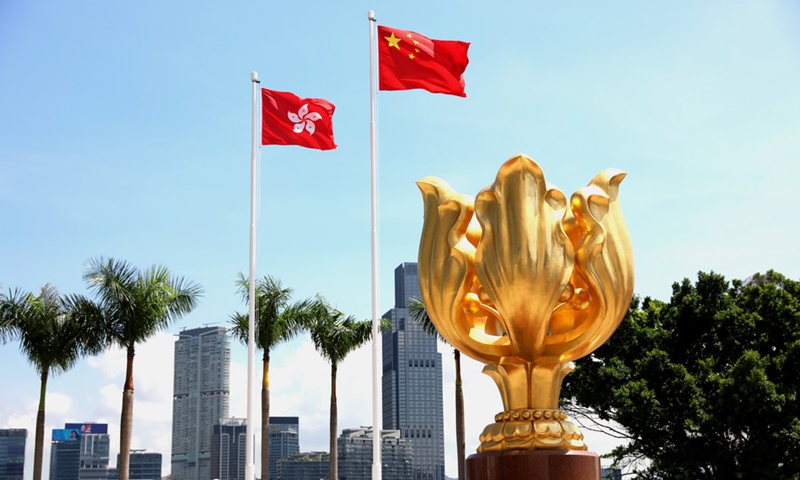HK justice secretary bashes collusion between US forces and rioters, calling for wide participation in Legco election

Photo taken on July 14, 2020 shows the Golden Bauhinia Square in south China's Hong Kong, July 14, 2020. Photo: Xinhua
Hong Kong Special Administrative Region's (HKSAR) Secretary of Justice Teresa Cheng Yeuk-wah called out blatant US collusion with anti-Hong Kong rioters to damage the Chinese central government and the SAR government, and called on the public to vote to ensure candidates who put the interests of Hong Kong residents first get elected.
Underhanded US forces have conspired with anti-Hong Kong rioters in an attempt to interfere in the internal affairs of China and the SAR. It constitutes a violation of international law, it is essential that all actors respect the rule of law and denounce such actions, Cheng said in a statement Thursday.
Sovereign equality is a basic practice within international relations and a basic principle of international law. The Charter of the United Nations clearly states the principle of sovereign equality, with a non-interference principle as a core concept.
No state or group of states has the right to intervene, directly or indirectly, for any reason whatsoever, in the internal or external affairs of any other state. Consequently, armed intervention and all other forms of interference or attempted threats against a state or against its political, economic and cultural elements, are in violation of international law, Cheng said, citing a UN declaration passed in 1970.
A judgment of the International Court of Justice in 1986 also reaffirmed that the principle of non-interference is part of international customary law.
The formulation and maintenance of the constitutional order belongs to the central authority. This is the basic principle of national sovereignty and a shared practice of the world. Chinese central government exercising sovereign power to improve the electoral system in Hong Kong has a solid legal basis and is pure internal affairs of China, Cheng said.
Cheng also emphasized that UN General Assembly resolution 62/7 posits that "there is no single model of democracy" and that "democracy does not belong to any country or region." According to the European Court of Human Rights, each country has its unique history, culture and political background, while any country has the right to establish and improve democracy based on its situation. Another country is not justified in imposing its system on others and meddle in their internal affairs.
Cheng's remarks were made on the eve of the highly choreographed democracy summit in the US, at which Hong Kong fugitive Nathan Law has been invited by the White House to deliver remarks.
Hong Kong will hold a key LegCo election on December 19, and Cheng called on all registered voters to participate and elect candidates who want to serve society and put public welfare first.
Electoral reform is a milestone in the development of Hong Kong's democratic electoral system. This series of reforms reflects wider representation, political inclusiveness, balanced participation and fair competition, Cheng said, adding it implemented the principle of "patriots governing Hong Kong" and ensured the "one country, two systems" can sail far and steadily.
